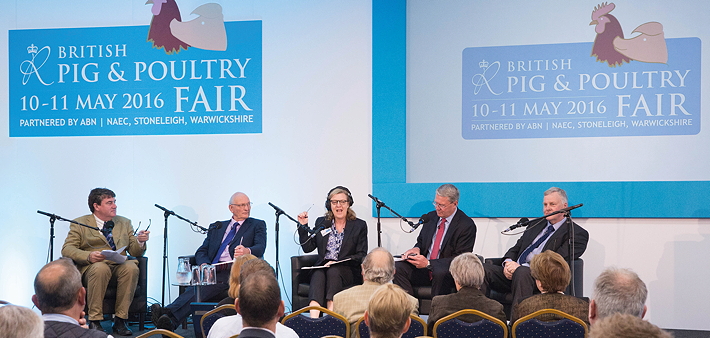Farming pundits may be pushing to stay in Europe because the system works and the EU provides security in terms of trade, employment and business development, writes Jane Jordan, but a growing number of farmers feel food security and safety issues warrant more discussion in the referendum debate, as moving out presents risks we don’t need to take.
Those who joined BBC Radio 4’s live EU debate at the British Pig & Poultry Fair heard a snapshot of the confusion that currently surrounds issues of food prices and security of supplies in a post-Brexit UK. ‘Will the country be able to feed itself safely and economically if it chooses to leave the single market?’ was the most prominent question, but no clear answers were provided.
The debate panel included (from left) Berkshire farmer Colin Rayner, UKIP MEP Stuart Agnew, Charlotte Smith of BBC Radio 4, AHDB chairman Sir Peter Kendal and Oxfordshire poultry producer James Hook
Brexit campaigners say consumers will benefit from cheap food and more choice as the door will be flung open to less expensive imports. A willingness to reduce tariffs to developing nations appears to be a unilateral recommendation. It will, they say, encourage trade in cheaper commodity products, and also support economies in poorer nations, which will also help to lessen the UK’s foreign aid bill.
What’s not understood are the implications that such policies will have on food safety, livestock health and animal welfare.
The chairman of the AHDB, Sir Peter Kendal, said that the “exit campaign” needed a reality check. Cheaper food and higher standards won’t help the farming industry or consumers. Pulling in more produce from places like Brazil, India and Thailand will not improve the quality and safety of food supplies, or guarantee better animal welfare.
Exit campaigner and UKIP agriculture spokesman Stuart Agnew MEP said prospects for British pig and poultry farmers would be far better if the UK left the EU. Single market membership would mean more regulation and more expense, and tougher competition from European member states that don’t adhere to the rules.
He said most EU countries, particularly those in eastern Europe, didn’t operate the same production standards as the UK; they flouted welfare legislation and yet they continued to trade their pigmeat, eggs and poultry products on an equal footing. Independence would give the UK options for trade agreements and market protection incentives that could outlaw substandard food products and agricultural commodities.
However, a key concern was how such policies would be policed and financed. If tariffs did come down, it was likely that the market would be flooded by cheap imports, and who would foot the bill for inspections and certification to ensure domestic producers and UK consumers were protected from substandard products.
Level best
The chairman of AHDB Pork, Meryl Ward, said Europe’s unlevel playing field already created significant problems for the pig sector, but wondered if free trade with the rest of the world would improve matters.
“European production is not equal, but will our Government support us with import duties capable of protecting our industry’s higher welfare standards and total supply chain assurance – requirements that are expected by consumers,” she added. “These are key considerations for us, and in or out, I’m confident the UK pig industry will continue to fight its corner.”
Other major concerns voiced during the Radio 4 debate focused on food safety and public health, with regard to zoonotic diseases, and animal health and biosecurity. Protecting the health status of our nation’s pig herds and poultry flocks must be prioritised if the UK is to retain and expand its lucrative export trade. New and emerging markets, such as China, Australia, South-east Asia and the Americas will become increasingly important going forward, but we could risk losing them if the domestic market was subject to an influx of cheap meat imported from regions with a high incidence of notifiable diseases or strains of pathogens that we don’t have here.




